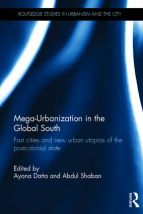Mega-Urbanization in the Global South: Fast cities and new urban utopias of the postcolonial state

Alongside the slow food, slow fashion and slow travel movements is slow urbanism, as promoted in this book. Mega-Urbanization in the Global South tells cautionary tales about cities or city districts that have grown more quickly than their environments or population dynamics allowed. The case studies span cities in the UAE, South Korea, Qatar, India, Indonesia, Zambia, and China. (It may be a bit misleading to refer to all of these as cities of the global South, but in general the book is interested in emerging models of urbanization in non-Western societies).
The chapter provocatively titled “Speed Kills” examines eco-cities built from scratch within a few decades, focusing on Masdar City in Abu Dhabi. Masdar City is a large master-planned development, intended to showcase environmental innovations through capital-intensive projects. Throughout the processes of design, construction and regulation, planners have aimed to move quickly. The author argues that the speed of the process is ostensibly for the sake of sustainability, yet – ironically – this speed limits sustainability. For instance, there is narrow attention to clean energy technology at the expense of considering social and other environmental dimensions (such as ecosystem services).
The chapter on Lusaka investigates the power relations undergirding fast and large-scale master planning. The author contends that this relational approach usefully allows us to understand planning “to be as much about mediating different discourses and relationships as it is about designing and redesigning the physical urban landscape” (page 185). Specifically, he analyses the development of the ambitious “2030 vision” master plan by the Japanese International Cooperation Agency, to address Lusaka’s congestion and other problems. The author draws attention to the way this process framed expertise and capability as belonging to external organizations, instead of seeking to empower and strengthen the capacity of Zambian entities. The discourse analysis in this chapter also highlights the 2030 vision’s emphasis on modernization, internationalization and marketability to donors and investors, concerns that are far removed from the everyday lives of Lusaka’s residents.
Overall, this book argues that, contrary to popular belief, slow urbanism can be positive – rather than a shackling of progress. Its chapters spell out problems of quick urban development, from neglect of rights to acceleration of inequality. Thus, the conclusion calls “for a more careful consideration of time as a way to enrich (rather than bypass) processes of democracy, citizenship, sustainability and belonging in the making of cities” (page 208). Stated very simply, when it comes to shaping urbanization, it is better to do things right than to do them fast – although many city planners and authorities appear to take the opposite view.
Further reading:
Mayer, Heike and Paul L Knox (2006), “Slow Cities: Sustainable Places in a Fast World”, Journal of Urban Affairs Vol 28, No 4, pages 321–334, available at http://goo.gl/a95Fya.
Turok, Ivan and Gordon McGranahan (2013), “Urbanization and economic growth: the arguments and evidence for Africa and Asia”, Environment and Urbanization Vol 25, No 2, pages 465–482, available at http://journals.sagepub.com/doi/full/10.1177/0956247813490908.
Watson, Vanessa (2014), “African urban fantasies: dreams or nightmares?”, Environment and Urbanization Vol 26, No 1, pages 215–231, available at http://journals.sagepub.com/doi/full/10.1177/0956247813513705.
Book note prepared by Christine Ro
Search the Book notes database
Our Book notes database contains details and summaries of all the publications included in Book notes since 1993 - with details on how to obtain/download.
Use the search form above, or visit the Book notes landing page for more options and latest content.
For a searchable database for papers in Environment and Urbanization, go to http://eau.sagepub.com/

